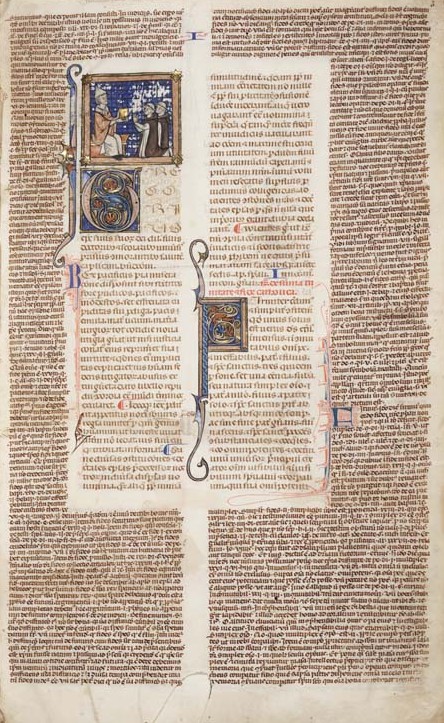Jacobus De Boragine on:
[Wikipedia]
[Google]
[Amazon]
 Jacobus de Boragine was one of the
Jacobus de Boragine was one of the  He was an author of many parts of the Gloss of the ''
He was an author of many parts of the Gloss of the ''
 Jacobus de Boragine was one of the
Jacobus de Boragine was one of the Glossator
The scholars of the 11th- and 12th-century legal schools in Italy, France and Germany are identified as glossators in a specific sense. They studied Roman law based on the '' Digesta'', the ''Codex'' of Justinian, the ''Authenticum'' (an abridged ...
s, and Four Doctors of Bologna
The Four Doctors of Bologna (Latin: ''Quatuor Doctores'') were Italian jurists and glossators of the 12th century, based in the University of Bologna: Bulgarus, Martinus Gosia, Jacobus de Boragine and Hugo de Porta Ravennate.
Their teachings in ...
.
Also known as Jacobus, he was born in the early 12th century and was an Italian
Italian(s) may refer to:
* Anything of, from, or related to the people of Italy over the centuries
** Italians, an ethnic group or simply a citizen of the Italian Republic or Italian Kingdom
** Italian language, a Romance language
*** Regional Ita ...
lawyer
A lawyer is a person who practices law. The role of a lawyer varies greatly across different legal jurisdictions. A lawyer can be classified as an advocate, attorney, barrister, canon lawyer, civil law notary, counsel, counselor, solic ...
, one of four students of Irnerius
Irnerius (– after 1125), sometimes referred to as ''lucerna juris'' ("lantern of the law"), was an Italian jurist, and founder of the School of Glossators and thus of the tradition of Medieval Roman Law.
He taught the newly recovered Roman l ...
called the ''Quattuor Doctores'', although Savigny disputes the general tradition of his inclusion in this list. The other doctors were Bulgarus
Bulgarus was a twelfth-century Italian jurist, born in Bologna. He has been confused with Bulgarinus, a 15th-century jurist.
He was the most celebrated of the famous Four Doctors of the law school of the University of Bologna and was regarded as ...
, Martinus and Hugo
Hugo or HUGO may refer to:
Arts and entertainment
* ''Hugo'' (film), a 2011 film directed by Martin Scorsese
* Hugo Award, a science fiction and fantasy award named after Hugo Gernsback
* Hugo (franchise), a children's media franchise based on ...
. The legal philosophy
Philosophy (from , ) is the systematized study of general and fundamental questions, such as those about existence, reason, knowledge, values, mind, and language. Such questions are often posed as problems to be studied or resolved. Some ...
of Bulgarus adhered closely to the letter of the law
The letter of the law and the spirit of the law are two possible ways to regard rules, or laws. To obey the letter of the law is to follow the literal reading of the words of the law, whereas following the spirit of the law means enacting the ...
while their fellow, Martinus, took a more natural law
Natural law ( la, ius naturale, ''lex naturalis'') is a system of law based on a close observation of human nature, and based on values intrinsic to human nature that can be deduced and applied independently of positive law (the express enacte ...
and Equity
Equity may refer to:
Finance, accounting and ownership
* Equity (finance), ownership of assets that have liabilities attached to them
** Stock, equity based on original contributions of cash or other value to a business
** Home equity, the dif ...
approach. His time at Bologna was therefore one of the formative times in legal theory
Jurisprudence, or legal theory, is the theoretical study of the propriety of law. Scholars of jurisprudence seek to explain the nature of law in its most general form and they also seek to achieve a deeper understanding of legal reasoning a ...
.
 He was an author of many parts of the Gloss of the ''
He was an author of many parts of the Gloss of the ''Corpus juris civilis
The ''Corpus Juris'' (or ''Iuris'') ''Civilis'' ("Body of Civil Law") is the modern name for a collection of fundamental works in jurisprudence, issued from 529 to 534 by order of Justinian I, Byzantine Emperor. It is also sometimes referred ...
''.
*The legal commentary ''De Regulis Juris'', which Savigny called "a striking example of the brilliant results which had been obtained in a short space of time by a constant and exclusive study of the sources of law".
He died in 1178.Witolda Wołodkiewicza, Prawo rzymskie. Słownik encyklopedyczny. (Warszawa: Wiedza Powszechna, 1986) p. 163.
References
Italian Roman Catholics 12th-century Italian jurists 12th-century Latin writers 11th-century births 1178 deaths Year of birth unknown Year of death unknown {{Italy-law-bio-stub